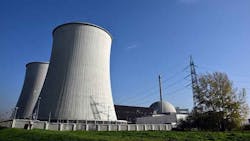Nuclear Power Crucial for UN Climate Goal: Top Scientist
LE BOURGET, France—Capping global warming at two degrees Celsius, the UN goal, would require a massive scaling up of nuclear power, a top climate scientist said Thursday.
But even if humanity meets the target (3.6 degrees Fahrenheit), we are unlikely to avoid catastrophic climate impacts, mainly from rising oceans, James Hansen said.
One of the most influential climate scientists over the last three decades, Hansen's testimony before the US Congress in the 1980s that warming had begun made headlines around the world.
"Two degrees is definitely very dangerous," Hansen said while on the margins of fraught UN negotiations in Paris for a deal to keep Earth liveable and help vulnerable countries cope with climate impacts.
"Two degrees Celsius warming above pre-industrial levels would put us at least at the temperature of the last inter-glacial period--sea level was six to nine metres (20-30 feet) higher then," he said.
"Half of the major cities in the world are on coastlines," he added.
"If we let ice sheets become unstable, the world may become ungovernable because the economic consequences would become so great."
The Greenland and West Antarctic ice sheets together contain enough frozen water to raise sea levels 13 meters (43 feet).
Hansen ran NASA's Goddard Institute for Space Studies in Maryland, a major center for climate science, from 1981 to 2013.
As he became more alarmed by the dimensions of the climate problem, he stepped outside the usual confines of scientific research and began to lobby for policies he thought could help beat back the threat.
For nearly a decade, he has called for a tax on carbon, suggesting that the proceeds be redistributed to consumers based on how much greenhouse gases they emitted.
Hansen said Thursday that nuclear power, a controversial source because of safety fears, must become a core part of the global energy mix in order to rapidly draw down the greenhouse gases that drive global warming.
"All you have to do is look at emissions from China, India and the rapidly developing countries. It is almost entirely coal," the most carbon-intensive of all fossil fuels, he said.
"The solution of the climate problem has to be carbon-free electricity. And you simply are not going to get there in China and India without the help of nuclear."
Currently, 80% of energy production and consumption is generated by fossil fuels.
Solar and wind energy is expanding rapidly, and attracting investment, but renewables still account for less than five percent of the energy mix -- not counting nuclear.
On current trends, Earth is on track to warm by about 4 C (7.2 F), which would yield an deadly maelstrom of mass migration and misery fueled by extreme heat, superstorms and coastal flooding.
Carbon-cutting pledges from more 180 nations to bolster the sought-after Paris agreement put us on track for a 3 C world.
Copyright Agence France-Presse, 2015
About the Author
Agence France-Presse
Copyright Agence France-Presse, 2002-2025. AFP text, photos, graphics and logos shall not be reproduced, published, broadcast, rewritten for broadcast or publication or redistributed directly or indirectly in any medium. AFP shall not be held liable for any delays, inaccuracies, errors or omissions in any AFP content, or for any actions taken in consequence.
